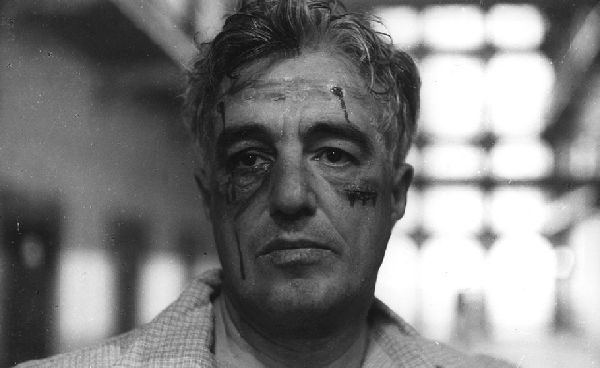Il generale Della Rovere (1959) 

Director: Roberto Rossellini
Cast: Vittorio De Sica, Hannes Messemer, Sandra Milo
Synopsis: Bardone, a petty con man, is arrested by the Gestapo and coerced into impersonating a partisan leader in order to expose another resistance organizer.
Victorio Bardone (Vittorio De Sica) is a con man operating amongst the shattered cityscape of war-torn Italy under Nazi occupation. He funds his addiction to gambling by taking payment for the rescue of Italian civilians who have been arrested by the Nazis. He even attempts to do as he promises with the aid of an accomplice within the German army, but we get the impression that any failure to secure a release is accepted with little more than a shrug of the shoulders, and his finances are in such poor condition that he must either use payment from a current client to finance the possible release of the previous one or pawn the fake sapphire he bought for an unappreciative girlfriend.
Given the slipshod nature of his operation, it’s perhaps inevitable that a wealthy client he has lined up is suspicious enough to report him to the police, and he is interrogated by SS Colonel Mueller (Hannes Messemer), with whom he has previously had some friendly interactions. Mueller persuades Bardone to pose as Italian General Della Rovere in the wing of a prison reserved for political prisoners in the hope that a leader of the underground who is held in the prison, but whose identity is unknown, will make himself known to the ‘general.’ Driven by his will to survive, Bardone agrees to the assignment, but his experiences in the prison have an unexpected effect on the former con man.
Given his success as a director, it’s easy to forget just how accomplished an actor Vittorio De Sica was. He gives a skilfully nuanced performance here as Bardone, creating a complex character who, like us all, is neither good nor bad but a product of circumstance. His natural charisma makes it impossible to dislike Bardone, even when he seems to be fleecing old men of their life savings, and the ambiguity of his true character is brought home by his genuine pleasure at being able to inform that old man we — and probably he — thought he was fleecing, that as a result of his intervention the old man’s son will remain in Italy after all. It’s important that these traces of empathy for the wretched souls who come to him and the sense that he is perpetually repressing the feelings of guilt he suffers over his behaviour are evident in the first half of the movie in order for his slow transformation during his imprisonment to be convincing. However, that does mean that Bardone’s fraudulent manoeuvrings do take up a lot more of the film’s lengthy running time than it probably should.
The depth of character given to Bardone is also evident in the character of Mueller, who is refreshingly free of the one-dimensional attributes normally awarded to screen Nazis. He, too, is a product of circumstance, an ordinary man caught in extraordinary times who possesses a balanced perspective and is capable of acts of kindness. This greying of the conventional black and white hats adds greater impact to the movie’s tragic but uplifting final scenes and makes for an absorbing and effective tale.
(Reviewed 20th July 2014)
httpv://www.youtube.com/watch?v=PvM7_Mqn_Ow
